- Home
- Charles L. Grant
Chariot - [Millennium Quartet 03] Page 14
Chariot - [Millennium Quartet 03] Read online
Page 14
Do you follow me, Mr. Falkirk? Do you understand?
There is a man, a priest, his name is Casey Chisholm and—ah, I see you’ve heard the name already. Is that so? And have you then heard of another man, a would-be writer named John Bannock? No, I don’t suppose you have. But they are compatriots of yours, Mr. Falkirk, and sooner or later you’re going to have to meet them. Talk to them. And to do that, you’re going to have to leave Las Vegas.
You’re going to have to leave soon.
That was the third question, Mr. Falkirk. How long do you think this safety in hiding is going to last?
Oh, dear, I’m not doing this very well, am I. Sir John is so much better at this sort of thing. He’s quite fond of you, you know, truly he is. But he has so little strength left, you see, that he can’t hold one’s attention as he used to, through the sheer power of his will. His voice. His words. He’s quite weak, Mr. Falkirk, but he refuses to stop until you’ve been made to see what must be done.
Here. Take this . . .oh, damn, I can never find anything in this blasted purse when I want to. The curse of my. . . ah. Here. Take this. Mr. Falkirk, please, take it. Thank you. I hope you can read my writing, it tends to get cramped when I write fast. Those places there, and there, the ones I’ve underscored, I think you’ll find that’s where the Sickness, as you call it, spreads from. Like ripples, I suppose. Easy enough to check on, if you have the time. But you don’t, you’ll just have to take my word for it.
Look at the dates, Mr. Falkirk. I believe if you crosscheck them against—
Mr. Falkirk, where are you going?
Please, don’t do this, oh God, I wish Sir John were here.
Mr. Falkirk, tomorrow night, watch the news. Do you hear me, Mr. Falkirk? Watch the news tomorrow night, then look out your window.
It’s dying, Mr. Falkirk. For God’s sake, your dragon is dying.
* * * *
4
H
e stumbled out of the hotel, and people thought he was drunk and side-slipped out of his way.
Ahead, past the overhang under which limousines and taxis and airport vans stopped to pick up and take on, the cone of the volcano rose above lush greenery and palm trees, just a fountain now, water spilling down its sides into pools in which alabaster statues of Chinese lions waded.
He walked down the left arm of the driveway’s half-moon arc until he reached the boulevard sidewalk. Holding on to the iron fencing that kept the crowds away from the grassy knoll that was the volcano’s base.
He could go left and watch a full-size British frigate sail into a cove where it would do battle with pirates amid explosions of fire and smoke; he could go up a little farther and duck into a yellow submarine restaurant with portholes for windows, where steam shot from pipes and the lights dimmed and the captain shouted, “Dive, dive,” and huge screens cycled through films of underwater caverns and sharks on the hunt; he could cross the street and go to the casino in a place that was Venice, complete with canals and gondoliers and every room a suite; he could go down to Paris and visit the Eiffel Tower; he could go back to Caesar’s and sit on a bench near the shops and watch the vaulted arch of the painted sky run through the day from dawn to dark and back again in less than an hour; he could go to the place where slot machines huddled under acrobats and highflyers; he could stop at the hotel where the food court was Greenwich Village, dark grey cobbled walks and flower pots in curtained apartment windows three and four stories above him.
He could.
But the sun was too bright and the traffic too noisy and he had had enough of things that didn’t make any sense. Of being a target.
Of let’s pretend.
So he walked back up the drive, left hand gliding along the top of the fence, and got in the line of chattering guests who waited for transportation. He said nothing to anyone and met no one’s gaze, and when his turn came, he tipped the all-too-cheerful doorman five dollars and got into the cab and deliberately faced straight ahead so he wouldn’t see Lady Beatrice standing, back in the entrance, clinging to her purse, her face flushed and her eyes filled with frustrated tears.
He did not think.
He concentrated on the street, on the several lanes of traffic, on the way shadows had begun to fill in the gaps and arches and windows and alleys, and he wondered only briefly where the afternoon had gone.
When the taxi dropped him off, he tipped the driver too much, and walked straight through the Excalibur without listening, without seeing, without thinking, until he reached the parking lot and unlocked the pickup’s door and sat behind the wheel with the window rolled down to let the stifling heat spill out of the cab with the engine running to get the air-conditioning in gear.
When he could grip the steering wheel without scorching his palms, he said, “For crying out loud, please, get me out of here, okay?” and pulled into the street, drove past the towers and the drawbridge and the moat with the once-a-night dragon, past the sphinx that crouched in front of the black glass pyramid, and in less than a blink, or so it seemed, backed into his driveway and shut the engine down.
He remembered nothing of the drive—no turns, no lights, no traffic—and his hands began to tremble because he could have hit someone or something and not remembered it at all.
When his hands calmed and his stomach stopped jumping, he shook himself and got out, closed the door, and patted the hood. He muttered, “Thanks,” and backed away quickly when the truck shuddered once and was still.
* * * *
He stood in the tiny shower stall and let cool water wash the stench of sweat away. When he was done, when the cool became cold and the cold became pain, he wrapped a towel around his waist and stared in the mirror over the bathroom basin.
Still you, he thought to his reflection, and looked away when his grin seemed too much like a grimace.
He picked up the white shirt Sir John had given him, balled it up, and carried it into the kitchen, where he slammed it into the trash. He closed the blinds in all the rooms. He turned on the air-conditioning by cranking the thermostat down with a single vicious twist of his wrist and listened to it clank and sputter like the struggle of old pipes. Then he sat cross-legged in the middle of the couch, hands loosely folded in his lap, and watched the sunglare around the edges of the windows fade, and turn dark.
* * * *
The air-conditioning shut off, thermostat setting reached, and the silence was much larger than the rooms in which he lived.
The girls knocked on the door, giggling, then calling out, then muttering, then leaving.
He heard cars drive by.
There were voices raised in shrill argument.
Later, much later, someone else knocked, softly, and he had no idea when whoever it was finally left.
Even later, the crunch of tires rolling slowly over the dirt. No engine sound. The sharp slam of a car door. Tires passing in the opposite direction.
And through it all, when his mind wavered, couldn’t stay blank, all he could think was who the hell are you?
* * * *
A stiffness in his neck.
He inhaled slowly, deeply, and let the air out in an explosive sigh so loud it sounded unnervingly like a sob.
His left hand passed over his right arm, the gooseflesh there like fine-grain. sandpaper. Gingerly, hissing in, he straightened his legs one at a time, waiting for the inevitable cramps in foot and calf and thigh. When they came, he rubbed them away absently, not really feeling the pain.
Listening, instead, to the silence in the house. In the street. Wondering how late it was but in no hurry to find his watch. A faint glow marked the windows’ edges, so the porch lights were on and the moon was probably out and full. Not yet midnight. Far too long till dawn.
Walking stiffly, kicking out a leg to loosen it, swinging an arm in a circle to bring back the circulation, he walked into the bedroom, tossed the towel aside and dressed without bothering to put on a pair of shoes. His bladder, now that he was back among the livi
ng, demanded release, and he gave it, and once given, he checked the mirror again and still didn’t like what he saw, even after he turned off the light.
Food, then. He hadn’t eaten since lunch, and that had been lost in the restroom at the Mirage. The memory of it put the taste of sour bile in his mouth, and he licked his lips constantly as he hurried into the kitchen and flung open the refrigerator door. A cock of his head—a beer, he figured, probably wasn’t wise. He grabbed a package of deli American cheese, a small jar of mustard, a head of lettuce. The bread was on the counter, between the sink and a small radio he usually listened to while he ate. As he made himself a sandwich, not too thick, he finally permitted his brain to get to work.
And the first thing he thought, with a self-mocking chuckle while he cut the sandwich in half, corner to corner, was that Lady Beatrice scared the living bejesus out of him. She was very kind, and rather attractive in a nontraditional sort of way, and she had to be a good . . . what, thirty or forty years younger than her husband? Easily; no problem.-But while Sir John merely angered him with his mysterious, mystical, bullshit three questions, Beatrice, in her fumbling for a way to explain and confuse him, made them sound too damn real.
As if she knew, knew, that he had posed them to himself a long time ago and had decided, rightly or wrongly, he didn’t want to know the answers.
He picked up the sandwich, opened his mouth to take a bite, and laughed briefly, deeply in his throat. A sudden vision of his mother, scolding him for eating breakfast at the counter one morning, ordering him to a chair because eating standing up offended her fragile sense of permanence. Even if you are in a hurry, she had told him sternly, there’s no cause being rude, announcing it to the world.
“Sure thing, Ma,” he whispered, flicked on the radio because he couldn’t take the soft sounds of his moving around any longer, and took the plate to the table. Sat. Stared at the pale green radio dial until the station number blurred. Blinked once and shook his head when he realized he was listening to Eula Korrey, somewhere in the middle of what had become, in so short a time, her trademark song. . . . you ready?
And the chorus, it must have been a million strong, answered a joyful, affirmative ready!
are you ready?
Finally he took the first bite, and the song became the background, and it occurred to him that neither Sir John nor Lady Beatrice had asked him that fourth question. He had walked out on both of them before they’d had the chance. Not that it would take a Strip magician to figure out what it would be.
“So tell me, Mr. Falkirk,” he said softly, badly mimicking Sir John’s accent, “what will happen to you if you ever leave the city, do you suppose?”
No supposing about it.
ready!
The way his luck had run, the next beating he took would be the last one he’d ever have. Thrashed and trashed, just like his sister. End of story. That’s all she wrote. Put a fork in him, Ma, this boy’s done.
He grunted. Shook his head.
It was, now that he thought about it, a monumentally, stupid notion. Obviously, what had begun as a series of unfortunate incidents had evolved over the years into a full-blown superstition, and he sure wasn’t the first gambler in the world to have at least one superstition riding hard on his back.
are you ready
Most of the men and women he had come across off and on the Strip had theirs so ingrained they didn’t even think about it, hardly knew it existed. It had taken on the strength of a powerful habit; you did it unconsciously until someone pointed it out to you. Maybe you shrugged in embarrassment, maybe you didn’t. But you didn’t drop it, either; the consequences simply didn’t bear thinking about.
Yet neither of the Harps had even suggested his touching each machine to find the right one was a simple superstition. They had accepted it, apparently, as a given. A fact. That without the touch he wouldn’t know one machine from another.
are you ready
That made him sit back and frown.
A glance to the back door, another to the front.
The implication was, they didn’t think his not wanting to leave Las Vegas was superstition either.
They believed it was true.
“Oh, yeah,” he muttered. “Right.”
Yet Beatrice had told him he would have to leave, to find one guy he’d never heard of and another whose name he had heard only in passing from a couple of kids who didn’t even know what the hell they were doing. And how did the Harps know that Chisholm’s name, anyway? Did they know those kids? Did-—
“Whoa!” he said, almost shouting. “Whoa!”
That feeling again, the slipping into some kind of weird warp thing, unreality sneaking in behind his back, whispering things in his ear in an unknown language. Panic over something that had no name, no face. A threat without definition.
are you ready, are you ready for a miracle’?
He slapped the table hard with a palm, stood so quickly the chair skittered back against the wall, and stomped to the counter, snapped off the radio and turned its face around, pulled the plug from its socket. What he didn’t need now, tonight, was that woman’s voice in his home.
It grated.
He had no idea why, but it grated.
He grabbed the remains of the sandwich off its plate, muttered a. “Sorry, Ma,” and ate as he wandered through the house, sliding fingers along a wall, brushing them over the top of a chair, the surface of a table, turning on a lamp and turning it right back off, slapping the crumbs from his hand against his leg, trying to whistle but his lips and mouth were too dry, returning to the kitchen where he grabbed three bottles out of the fridge and twisted off the cap of one as he marched to the front door, yanked it open, stepped outside, and shivered at the startling, pleasant feel of cool and rough concrete on his bare soles.
Since the temptation to drain the bottle in a couple of swallows was strong, he forced himself to sip.
Since he wanted, very much, to get into the chariot and find one or the other of those...whoever, whatever they were, and wring their necks for unspecified crimes against his peace of mind, he forced himself to sit on the top step, set the unopen bottles beside him, and sipped.
Since there was no reason on earth why he should feel the way he did, he concentrated on the taste of the beer, the feel of the glass bottle in his hand, on the feel of the concrete beneath his rump, on the touch of the night breeze on his cheek, and forced himself to keep his mind a blank while he sat there, in the dark, and sipped.
And when the last bottle was empty and he could find no excuse not to go inside and go to bed, he told himself that no nightmare could be as bad as the day he’d just had. At least, in their own bizarre ways, nightmares made sense.
He gripped the post and hauled himself up, swung toward the door, and heard the horse walking slowly up the street behind him.
He swallowed.
He held up a shaking finger as if to say there’s no sense turning around, pal, because there ain’t nothing there, and you’re just spooking yourself so don’t bother.
His hand began to tremble and he pulled it quickly to his chest, holding it there tightly, blinking rapidly because he was afraid, not of the horse but of the way his mind wouldn’t stop tripping over things that weren’t there. He was losing it. After all these years, he was losing it.
He didn’t laugh with relief when he finally looked up the street and saw nothing but the night.
Nor was he tempted to look again for tracks, for signs, for hints or indications.
If they were there, he didn’t want to know it; if they weren’t there, he didn’t want to know that either.
All he wanted to know, as he went inside and closed and locked the door behind him... all he wanted to know as he stumbled into the bedroom and stretched out on the bed without taking off his clothes ... no, he thought and clamped his eyes shut.
No, he thought an hour later, staring sleepless at the ceiling.
“Please,” he whispered, an
gry and uncertain and maybe a little scared. “Please, who are you?”
A faint buzzing static from the kitchen.
And Eula’s voice, singing, and laughing softly.
* * * *
Part 3
Are You Ready For A Miracle?
* * * *
1
1

![[Oxrun Station] The Orchard Read online](http://i1.bookreadfree.com/i/03/17/oxrun_station_the_orchard_preview.jpg) [Oxrun Station] The Orchard
[Oxrun Station] The Orchard![Riders in the Sky - [Millennium Quartet 04] Read online](http://i1.bookreadfree.com/i/03/20/riders_in_the_sky_-_millennium_quartet_04_preview.jpg) Riders in the Sky - [Millennium Quartet 04]
Riders in the Sky - [Millennium Quartet 04]![Chariot - [Millennium Quartet 03] Read online](http://i1.bookreadfree.com/i/03/19/chariot_-_millennium_quartet_03_preview.jpg) Chariot - [Millennium Quartet 03]
Chariot - [Millennium Quartet 03]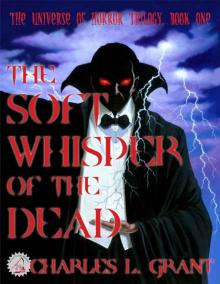 The Universe of Horror Volume 1: The Soft Whisper of the Dead (Neccon Classic Horror)
The Universe of Horror Volume 1: The Soft Whisper of the Dead (Neccon Classic Horror)![[Oxrun Station] Dialing The Wind Read online](http://i1.bookreadfree.com/i/03/19/oxrun_station_dialing_the_wind_preview.jpg) [Oxrun Station] Dialing The Wind
[Oxrun Station] Dialing The Wind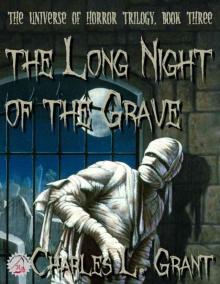 The Universe of Horror Volume 3: The Long Night of the Grave (Neccon Classic Horror)
The Universe of Horror Volume 3: The Long Night of the Grave (Neccon Classic Horror)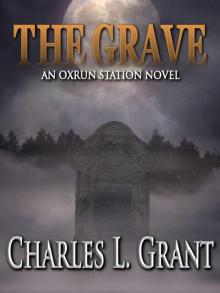 The Grave - An Oxrun Station Novel (Oxrun Station Novels)
The Grave - An Oxrun Station Novel (Oxrun Station Novels)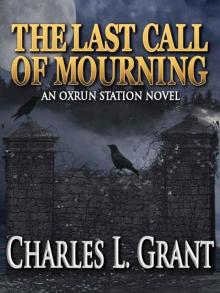 The Last Call of Mourning - An Oxrun Station Novel (Oxrun Station Novels)
The Last Call of Mourning - An Oxrun Station Novel (Oxrun Station Novels)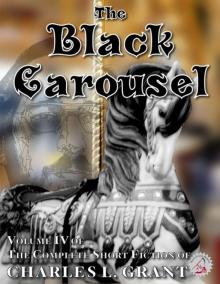 The Complete Short Fiction of Charles L. Grant, Volume IV: The Black Carousel
The Complete Short Fiction of Charles L. Grant, Volume IV: The Black Carousel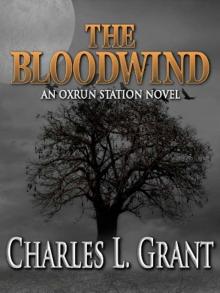 The Bloodwind - An Oxrun Station Novel (Oxrun Station Novels)
The Bloodwind - An Oxrun Station Novel (Oxrun Station Novels)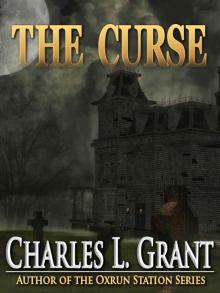 The Curse
The Curse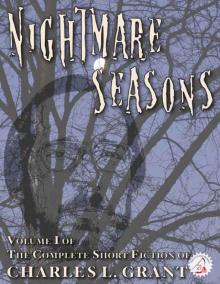 The Complete Short Fiction of Charles L. Grant Volume 1: Nightmare Seasons (Necon Classic Horror)
The Complete Short Fiction of Charles L. Grant Volume 1: Nightmare Seasons (Necon Classic Horror)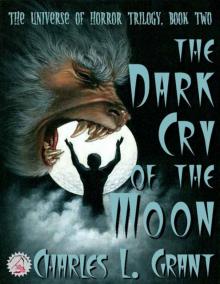 The Universe of Horror Volume 2: The Dark Cry of the Moon (Neccon Classic Horror)
The Universe of Horror Volume 2: The Dark Cry of the Moon (Neccon Classic Horror)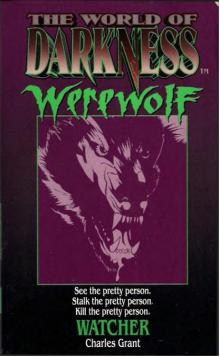 Watcher: Based on the Apocalypse (World of Darkness : Werewolf)
Watcher: Based on the Apocalypse (World of Darkness : Werewolf)![[Oxrun Station] The Bloodwind Read online](http://i1.bookreadfree.com/i/03/25/oxrun_station_the_bloodwind_preview.jpg) [Oxrun Station] The Bloodwind
[Oxrun Station] The Bloodwind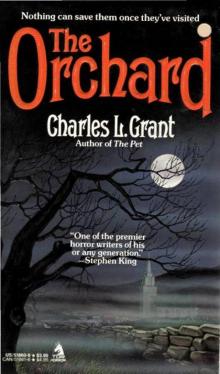 The Orchard
The Orchard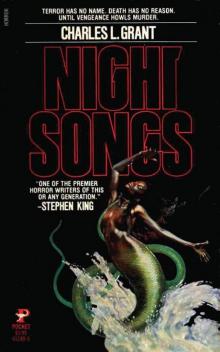 Night Songs
Night Songs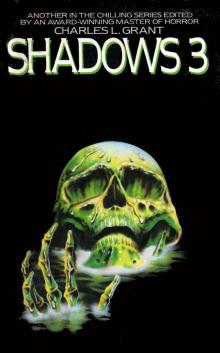 Shadows 3
Shadows 3![Symphony - [Millennium Quartet 01] Read online](http://i1.bookreadfree.com/i1/04/02/symphony_-_millennium_quartet_01_preview.jpg) Symphony - [Millennium Quartet 01]
Symphony - [Millennium Quartet 01] The Hour of the Oxrun Dead (Necon Classic Horror)
The Hour of the Oxrun Dead (Necon Classic Horror)![In the Mood - [Millennium Quartet 02] Read online](http://i1.bookreadfree.com/i1/03/31/in_the_mood_-_millennium_quartet_02_preview.jpg) In the Mood - [Millennium Quartet 02]
In the Mood - [Millennium Quartet 02]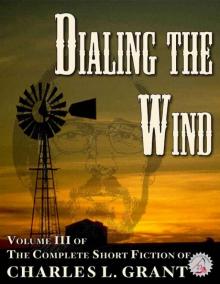 The Complete Short Fiction of Charles L. Grant Volume 3: Dialing the Wind (Neccon Classic Horror)
The Complete Short Fiction of Charles L. Grant Volume 3: Dialing the Wind (Neccon Classic Horror)![[Oxrun Station] The Last Call of Mourning Read online](http://i1.bookreadfree.com/i2/04/05/oxrun_station_the_last_call_of_mourning_preview.jpg) [Oxrun Station] The Last Call of Mourning
[Oxrun Station] The Last Call of Mourning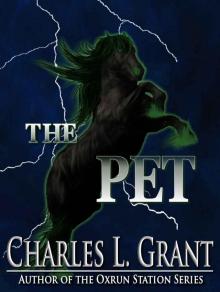 The Pet
The Pet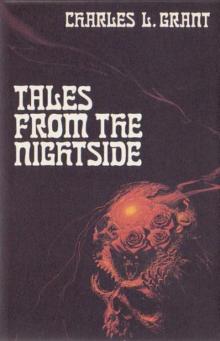 Tales from the Nightside
Tales from the Nightside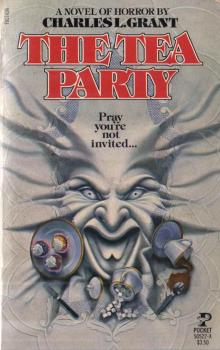 The Tea Party - A Novel of Horror
The Tea Party - A Novel of Horror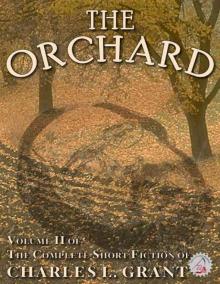 The Complete Short Fiction of Charles L. Grant Volume 2: The Orchard (Necon Classic Horror)
The Complete Short Fiction of Charles L. Grant Volume 2: The Orchard (Necon Classic Horror) Whirlwind
Whirlwind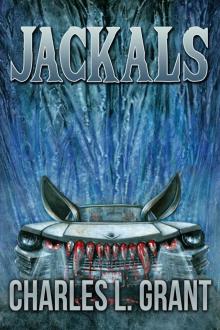 Jackals
Jackals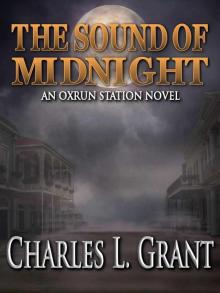 The Sound of Midnight - An Oxrun Station Novel
The Sound of Midnight - An Oxrun Station Novel